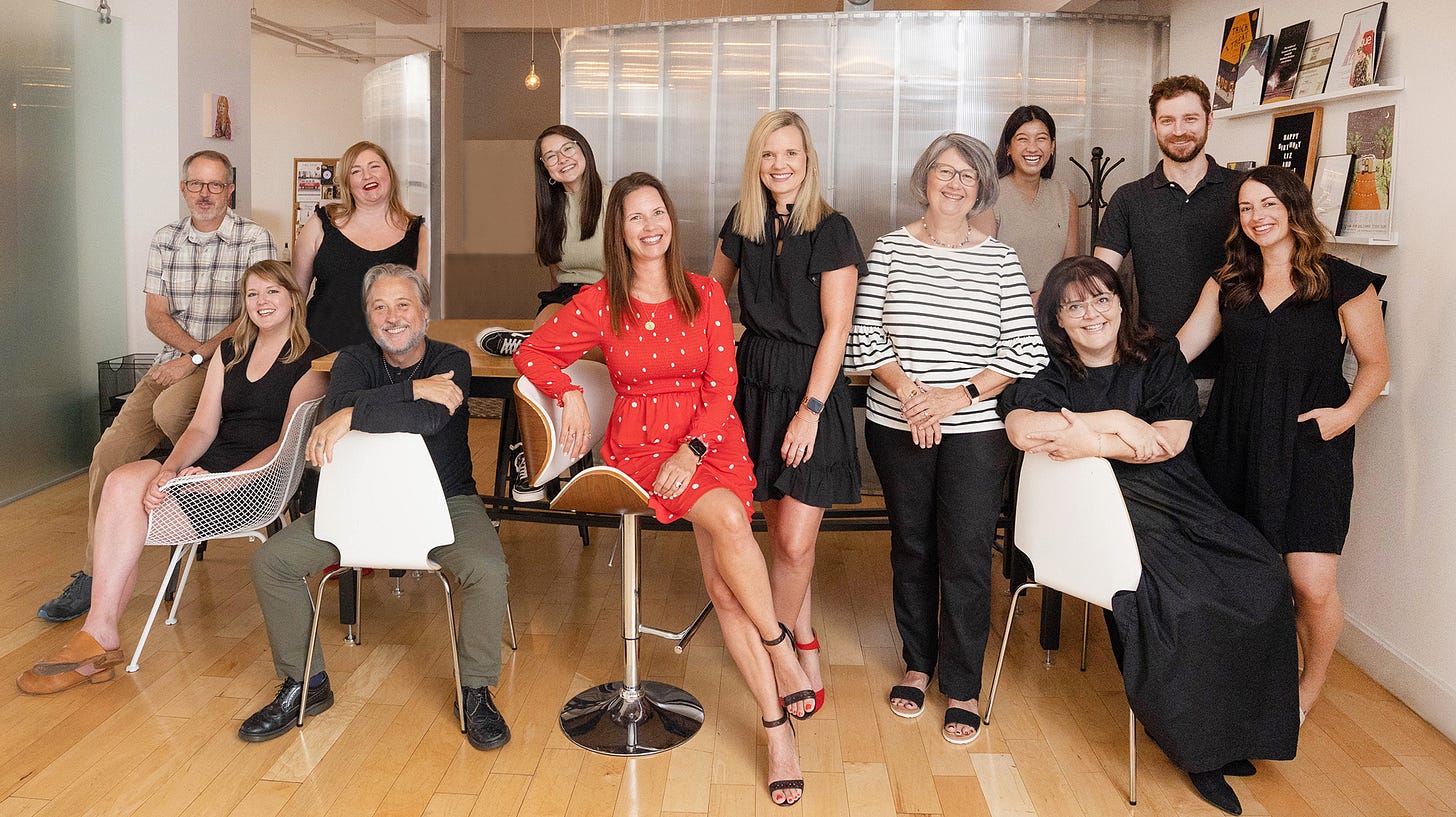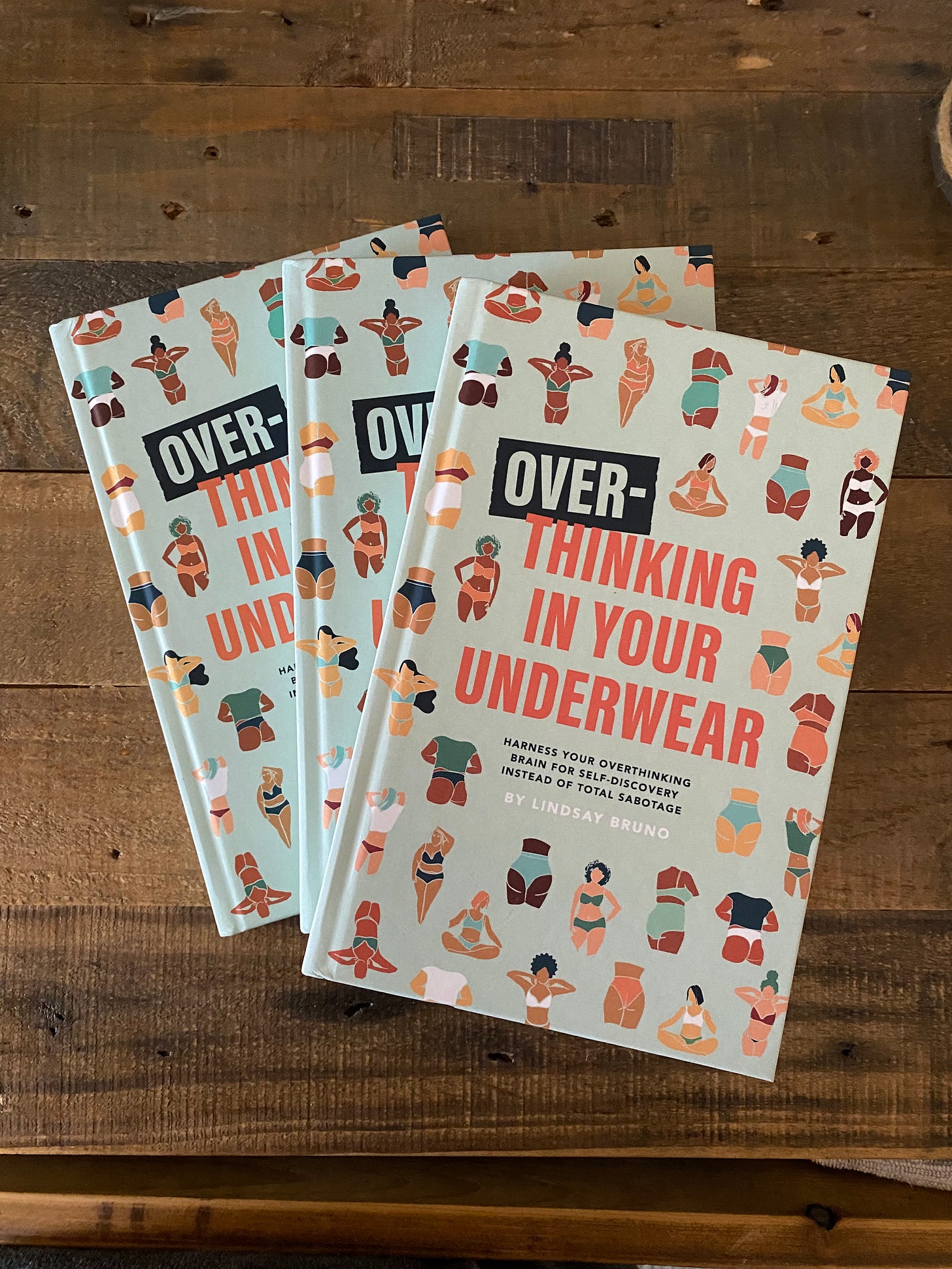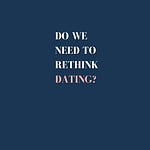In this episode, Lindsay sits down with Elizabeth McFadden, business owner and CEO of Novella Brandhouse to discuss the shift to remote work since the pandemic. How has remote and hybrid work changed office culture? What does the new way we work mean for employees and business owners? Are we healthier now than we were 20 years ago when Liz and Lindsay started the office grind? Listen now to hear the conversation.

Follow the show. Or watch on YouTube.
Enjoy my blog on remote work from earlier this year.
WFH Forever
I used to “office” hard. You know… really office. Team lunches, group happy hours, theme parties where I was the chairperson and dressed as Stevie Nicks. It’s not that there’s anything wrong with “officing” in and of itself. It’s that the pandemic showed me a new way to work and now I can’t unsee it. A way that’s healthier, more productive, and I will argue simply makes more sense.
Before March 2020, working from home was granted on special occasions or for niche jobs you heard about but didn’t understand. With the pandemic, WFH went viral as we cuddled our dogs and into our sweatpants.
Not everyone loved it, I have friends who feel they aren’t productive at home or miss the camaraderie of a workplace. These people skipped back to the office with the first lift of restrictions.
For others, like me, working from home gifted more than additional time with our fur babies. It gave us insight into a merry-go-round we’d been riding filled with an up and down of old ideas and unproductive work rituals.
For sixteen years, I worked in ad agencies of all shapes and sizes. Big names, small shops, East Coast firms, and Midwest companies. Some had better coffee bars while others had more foosball tables. They talked about “putting the brand first” and “leading with creativity.” They mounted a motto in their entryway urging us to “dream big,” “be brilliant,” or “work weird.” The slogans may have varied, but the jobs were all the same.
94% of employees report feeling like their work productivity is the same or higher than before they worked remotely.*
When you work in an office, you show up by nine, sit at a desk, attempt to be creative in an environment filled with interruptions and meetings, burn out around three, wander the halls looking for snacks, and browse the internet with one eye on the clock until five or six when it’s acceptable to leave. I’d begin a job full of fire, ready “do something amazing every day,” but two years in, daily status meetings and office politics extinguished my creativity.
If you’re a woman, or worse, a woman who smiles a lot, you’ll be asked to shoulder what some researchers call “office housework”—planning lunches, organizing baby showers, and heading up culture events. All activities outside your job description with no compensation beyond a high-five from your boss.
Think outside the cubicle
Henry Ford created the 40-hour work week comprised of eight hours a day, five days a week. Ford based this model on his automotive plants. His new concept of work offered a reprieve from the six day workweek in place at the time.* Almost a hundred years later, we continue to use Ford’s blueprint for how to run our modern world despite the lack of resemblance to his.
The pandemic forced us to drop the tightly held structure we adopted from our grandparents. Now I wake up at six, drink coffee with my dog, work for four hours with no interruptions until I eat breakfast. I work more. I usually break about noon and go to yoga. I come home and work until about 3:30. Remember, I only worked until 3:30 in that office job as well. Granted, there are Zoom calls here and there but they are quick, painless and don’t interrupt my creativity. The amount of work I get done at home versus in an office doesn’t even compare.
Without the pressure to cram creativity between office interruptions, I rediscovered why I love advertising in the first place. I’m able to “think big,” “work weird,” and live up to those entryway mottos in a way that doesn’t happen with the stale air of an office.
The energy to extrovert
Most people are surprised to learn I’m an introvert because I can “extrovert” like it’s my part-time job. When you work in an office—it is. As an introvert, you enjoy people and social situations but those situations drain your battery and require energy. And here’s the big take away. Your social battery and your productivity run on the same charge. In an office situation, we’re “on” at every moment, laughing through meetings, interacting at the snack bar, and chatting with Deb about her new pet bird. By the time you sit down to knock out that presentation, your battery is empty. You’re spending your energy “officing” instead of actually “jobbing.”
Your social battery and your productivity run on
the same charge.
Many articles, research and op eds report benefits for people beyond introverts. For some Black and Latino workers, working from home helps avoid the anxiety, awkwardness, and even micro aggressions that come with being a minority in an all caucasian office.
Let’s end on an allegory
In my twenties, I ran 30 miles a week. After work or on my lunch break, I’d hit the treadmill or the road to reach the number I set in my head.
One day, a friend invited me to yoga. At this point, I thought yoga was stretching for women in a quiet room. Translation: Yoga was for babies, and I was a runner. Along with my friend, I went to yoga but kept running. As I settled into my practice, I realized I was in shape in a whole new way. Yoga was gentler on my body, rewarding, and I enjoyed the class as hobby rather than a workout. I quit running altogether and for 15 years, yoga has been a beloved part of my week that keeps me fit and healthy.
We often think the hardest route is the best route. It doesn’t have to hurt to be worth it. Sometimes we’re just running for no reason and there’s a healthier way to live.
Let’s overthink it
Accepting your absolutes
I didn’t accept the idea of working from home right away. I would dance around it like a teenager on TikTok. I kept the idea of an office job on the back burner. I thought being in an office was “real work.” But I came to the realization that my mental peace was my absolute. It doesn’t make me weak or less ambitious than anyone else. I know how hard I work. And it doesn’t need to be within the confines of cube to be deemed valuable.
If you are considering a job or even a big life decision like a move, make a list of your absolutes. If I was making a list of absolutes for a job, it would look like this.
-Creativity
-Salary
-Good People
-WFH
Now order your list by importance.
-WFH
-Salary
-Good People
-Creativity
After a little overthinking, I realized I couldn’t consider an in-office job because WFH is my absolute. My mental health and physical health is too important to compromise. Maybe the first thing on your list is “salary,” that’s great. It’s your absolute and if you don’t hit that number you won’t be able to live well or feel valued. Know your absolutes and live by them.















Share this post